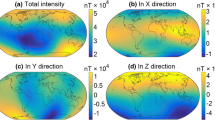Abstract
The differential GPS (DGPS) performance can be affected by the ionospheric variability, especially in low-latitude areas. We evaluated the behavior of the ionospheric variability in low-latitude areas in the 11-year cycle of the solar activity. During periods of solar maximum, the percentage of the daily maximum gradient that exceeds 50 mm/km has reached 73 % in 2001. Assuming that the baseline length is 20 km, the gradient larger than 50 mm/km can lead to more than 1.0-m ranging error, which is significant if we want to achieve meter-level accuracy with DGPS. An ionospheric gradient model built from a number of reference stations is proposed for estimating the differential ionospheric delays. The effectiveness of the model is demonstrated under both the quiet and active ionospheric conditions in low-latitude areas. For a short baseline length of 16.9 km in Hong Kong, the horizontal positioning accuracy can be improved by 41 and 61 % during active solar years and geomagnetic storms, respectively. The improvements show that the model is capable of reducing the spatial decorrelation caused by the ionospheric variability, and the model can be used in DGPS especially over the regions, such as low-latitude areas, where the large ionospheric variability happens frequently.










Similar content being viewed by others
References
Brunini C, Azpilicueta F (2009) Accuracy assessment of the GPS-based slant total electron content. J Geodesy 83(8):773–785
Chauhan V, Singh OP, Singh B (2011) Diurnal and seasonal variation of GPS-TEC during a low solar activity period as observed at a low-latitude station Agra. Ind J Phys 40:26–36
Chen W, Gao S, Hu C, Chen Y, Ding X (2008) Effects of ionospheric disturbances on GPS observation in low latitude area. GPS Solut 12(1):33–41
Datta-Barua S, Walter T, Pullen S, Luo M, Blanch J, Enge P (2002) Using WAAS ionospheric data to estimate LAAS short baseline gradients. Proc. ION-NTM-2002, Institute of Navigation, Anaheim, CA, pp 523–530
Datta-Barua S, Lee J, Pullen S, Luo M, Ene A, Qiu D, Zhang G, Enge P (2010) Ionospheric threat parameterization for Local area global-positioning-system-based aircraft landing systems. J Aircr 47(4):1141–1151
Ding F, Wan W, Ning B, Wang M (2007) Large scale traveling ionospheric disturbances observed by GPS total electron content during the magnetic storm of 29–30 October 2003. J Geophys Res 112:A06309
Ji S, Chen W, Weng D, Wang Z, Ding X (2013) A study on cycle slip detection and correction in case of ionospheric scintillation. Adv Space Res 51(5):742–753
Kao S, Tu Y, Ji S, Chen W, Wang Z, Weng D, Ding X, Hu T (2013a) A 2-d ionospheric model for low latitude areas-Hong Kong. Adv Space Res 51(9):1701–1708
Kao S, Tu Y, Chen W, Weng D, Ji S (2013b) Factors affecting the estimation of GPS receiver instrumental bias. Surv Rev 45(328):59–67
Kee C, Yun D (2002) Extending coverage of DGPS by considering atmospheric models and corrections. J Navig 55(2):305–322
Khanafseh S, Pullen S, Warburton J (2010) Carrier phase ionospheric gradient ground monitor for GBAS with experimental validation. Navigation 59(1):51–60
Konno H, Pullen S, Luo M, Enge P (2005) Analysis of ionosphere gradient using Japan GEONET data. Pro. ION-NTM-2005, Institute of Navigation, San Diego, CA, January, pp 1118–1129
Lee J, Pullen S, Datta-Barua S, Enge P (2006) Assessment of nominal ionosphere spatial decorrelation for LAAS. Proc. IEEE/ION-PLANS-2006, Institute of Navigation, San Diego, CA., April, pp 506–514
Lee J, Seo J, Park YS, Pullen S, Enge P (2011) Ionospheric threat mitigation by geometry screening in ground-based augmentation systems. J Aircr 48(4):1422–1433
Lejeune S, Wautelet G, Warrnant R (2012) Ionospheric effects on relative positioning within a dense GPS network. GPS Solut 16(1):105–116
Monteiro LS, Moore T, Hill C (2005) What is the accuracy of DGPS? J Navig 58:207–225
Pullen S, Enge P (2007) An overview of GBAS integrity monitoring with a focus on ionospheric spatial anomalies. Indian J Radio Space Phys 36:249–260
RTCA DO-245A (2004) Minimum aviation system performance standards for local area augmentation system (LAAS). Washington D.C. RTCA Inc.
RTCM (2001) Radio technical commission for marine services. RTCM Recommended standards for differential GNSS (Global Navigation Satellite Systems) Service, Version 2.3
Skone S (2002) Limitations in DGPS positioning accuracies at low latitudes during solar maximum. Geophys Res Lett 29(10):1439. doi:10.1029/2001GL013854
Skone S, Coster A (2009) Studies of storm-enhanced density impact on DGPS using IGS reference station data. J Geodesy 83(3–4):235–240
Acknowledgments
The research was substantially funded by Hong Kong RGC General Research fund (A/C: PolyU 5131/10E) and the Fundamental Research Funds for the Central Universities (Grant No. 14CX02036A).
Author information
Authors and Affiliations
Corresponding author
Rights and permissions
About this article
Cite this article
Weng, D., Ji, S., Chen, W. et al. Assessing and mitigating the effects of the ionospheric variability on DGPS. GPS Solut 19, 107–116 (2015). https://doi.org/10.1007/s10291-014-0372-x
Received:
Accepted:
Published:
Issue Date:
DOI: https://doi.org/10.1007/s10291-014-0372-x




